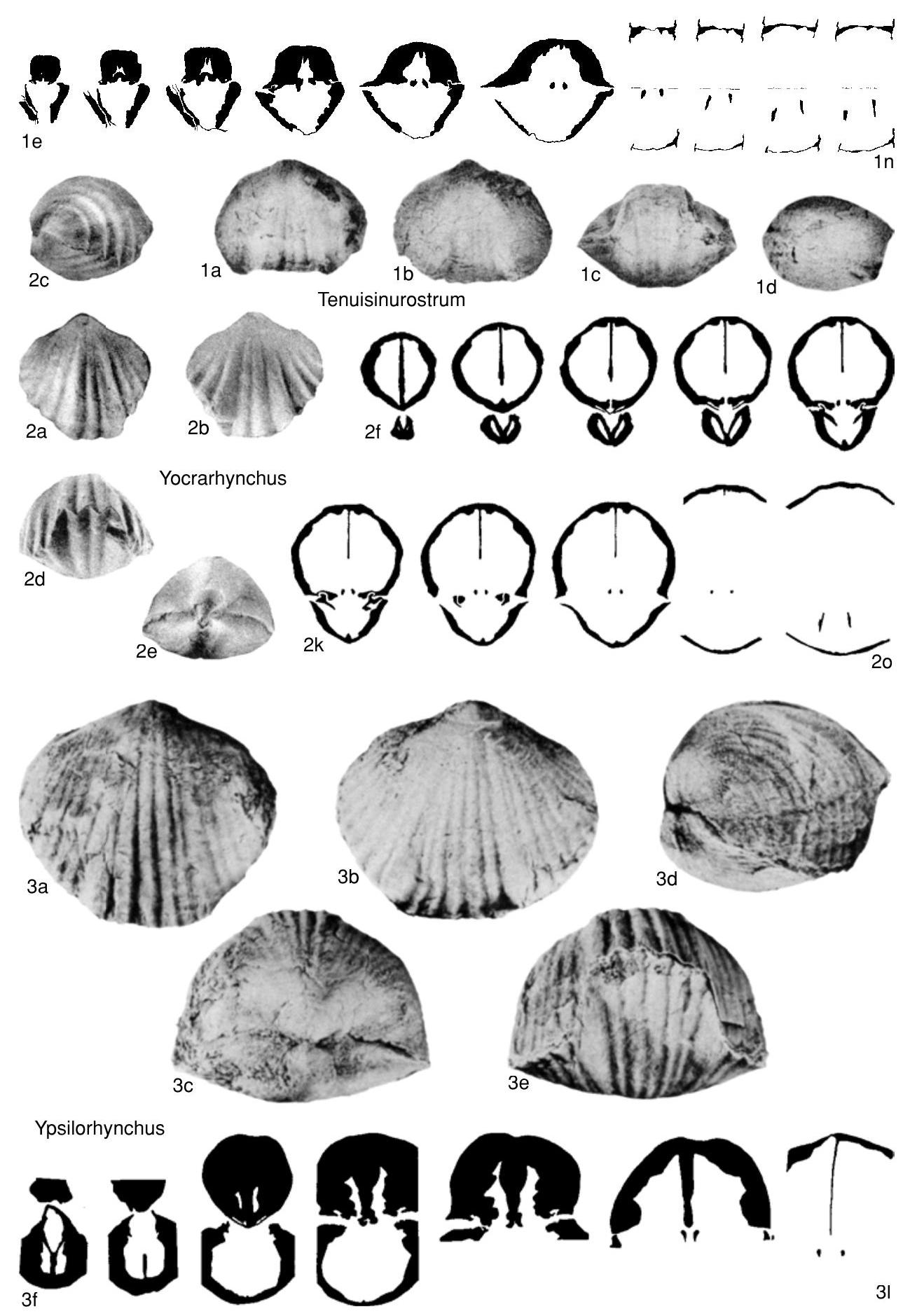Welcome to the Treatise on Invertebrate Paleontology!
Please enter a genera name to retrieve more information.

Ypsilorhynchus
Classification
Phylum:
Brachiopoda
Subphylum:
Rhynchonelliformea
Class:
Rhynchonellata
Order:
Rhynchonellida
Superfamily:
Camarotoechioidea
Family:
Leiorhynchidae
Subfamily:
Leiorhynchinae
Formal Genus Name and Reference:
Ypsilorhynchus Sartenaer, 1970a, p. 9
Type Species:
Leiorhynchus manetoe MCLAREN, 1962, p. 79, OD
Images
(Click to enlarge in a new window)
Fig. 778,3a–l. *Y. manetoe (MCLAREN), upper Eifelian, Headless Formation, Northwest Territories, southern Manetoe Range, western Canada; a–e, holotype, dorsal, ventral, posterior, lateral, and anterior views, ×1; f–l, serial sections 2.4, 2.8, 4.1, 4.8, 5.3, 6.8, 9.9 mm from posterior, × 1.5 (McLaren, 1962).
Synonyms
Geographic Distribution
western North America, China
Age Range
Beginning Stage in Treatise Usage:
Middle Devonian (Eifelian)
Beginning International Stage:
Eifelian
Fraction Up In Beginning Stage:
0
Beginning Date:
394.3
Ending Stage in Treatise Usage:
Middle Devonian (Givetian)
Ending International Stage:
Givetian
Fraction Up In Ending Stage:
100
Ending Date:
378.9
Description
Subcircular to transversely ovate outline and dorsibiconvex to galeate profile. Beak incurved. Fold and sulcus broad, low, extending from umbones, anterior commissure uniplicate, tongue broad, low, serrate. Costae moderately strong on fold and sulcus, weak on flanks, with some bifurcation. Dental plates short, meeting ventrally where supported by septum to form spondylium, ventral muscle field elongate, narrow posteriorly, expanding anteriorly, well impressed. Dorsal median septum high, thick posteriorly, thin anteriorly, extending to midlength, well impressed, septalium very short, hinge plates very short, breaking up immediately anterior of septalium, crura close together, long, slender, strongly curved ventrally.
References
Museum or Author Information
Classification
Phylum:
Brachiopoda
Subphylum:
Rhynchonelliformea
Class:
Rhynchonellata
Order:
Rhynchonellida
Superfamily:
Camarotoechioidea
Family:
Leiorhynchidae
Subfamily:
Leiorhynchinae
Formal Genus Name and Reference:
Ypsilorhynchus Sartenaer, 1970a, p. 9
Type Species:
Leiorhynchus manetoe MCLAREN, 1962, p. 79, OD
Images
(Click to enlarge in a new window)
Fig. 778,3a–l. *Y. manetoe (MCLAREN), upper Eifelian, Headless Formation, Northwest Territories, southern Manetoe Range, western Canada; a–e, holotype, dorsal, ventral, posterior, lateral, and anterior views, ×1; f–l, serial sections 2.4, 2.8, 4.1, 4.8, 5.3, 6.8, 9.9 mm from posterior, × 1.5 (McLaren, 1962).
Synonyms
Geographic Distribution
western North America, China
Age Range
Beginning Stage in Treatise Usage:
Middle Devonian (Eifelian)
Beginning International Stage:
Eifelian
Fraction Up In Beginning Stage:
0
Beginning Date:
394.3
Ending Stage in Treatise Usage:
Middle Devonian (Givetian)
Ending International Stage:
Givetian
Fraction Up In Ending Stage:
100
Ending Date:
378.9
Description
Subcircular to transversely ovate outline and dorsibiconvex to galeate profile. Beak incurved. Fold and sulcus broad, low, extending from umbones, anterior commissure uniplicate, tongue broad, low, serrate. Costae moderately strong on fold and sulcus, weak on flanks, with some bifurcation. Dental plates short, meeting ventrally where supported by septum to form spondylium, ventral muscle field elongate, narrow posteriorly, expanding anteriorly, well impressed. Dorsal median septum high, thick posteriorly, thin anteriorly, extending to midlength, well impressed, septalium very short, hinge plates very short, breaking up immediately anterior of septalium, crura close together, long, slender, strongly curved ventrally.
